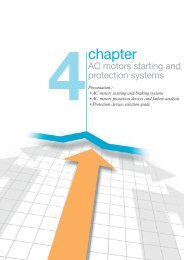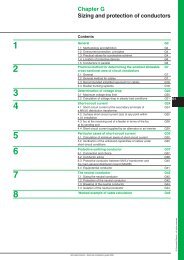Connect - Schneider Electric
Connect - Schneider Electric
Connect - Schneider Electric
Create successful ePaper yourself
Turn your PDF publications into a flip-book with our unique Google optimized e-Paper software.
1 DESCRIPTION OF THE GROUP, AND ITS STRATEGY, MARKETS AND BUSINESSES<br />
RISK FACTORS<br />
Infrastructure, Industry, IT, Buildings and CST businesses. Details<br />
on asset impairment are provided in note 1.11 to the consolidated<br />
fi nancial statements (Chapter 5).<br />
Where the recoverable amount of an asset or CGU is lower than<br />
its book value, an impairment loss is recognised. Where the<br />
tested CGU comprises goodwill, any impairment losses are fi rstly<br />
deducted therefrom.<br />
The Group is dependent upon hiring and<br />
retaining highly qualified management and<br />
technical personnel<br />
Competition for highly qualifi ed management and technical<br />
personnel is intense in the Group’s industry. Future success<br />
depends in part on the Group’s ability to hire, assimilate and retain<br />
engineers, salespeople and other qualifi ed personnel, especially in<br />
the area of energy effi ciency solutions.<br />
The Group put in place a “Workforce strategic planning” process<br />
in 2011 in order to more effectively face this challenge. It allows<br />
Industrial and environmental risks<br />
The Group may be the subject of product<br />
liability claims and other adverse effects due<br />
to defective products, design faults or harm<br />
caused to persons and property<br />
Despite its testing and quality procedures, the Group’s products<br />
might not operate properly or might contain design faults or defects,<br />
which could give rise to disputes in respect of its liability as seller or<br />
manufacturer, notably in Europe, where liability related to defective<br />
products could lead to a loss of revenue, claims under warranty and<br />
legal proceedings. Such disputes could result in a fall-off in demand<br />
or harm <strong>Schneider</strong> <strong>Electric</strong>’s reputation for safety and quality.<br />
To prevent or limit these risks, the Group recalls products if there<br />
are any doubts whatsoever that a product or one of its components<br />
is not 100% safe in respect of people and/or equipment. At the end<br />
of 2009, the Group launched a broad recall campaign concerning a<br />
range of low voltage capacitors produced between 2004 and 2008.<br />
This campaign continued in 2010 and 2011 and will be concluded<br />
in this fi rst quarter of 2012. Another broad recall campaign concerns<br />
a global campaign to recall Vigi Compact NS/NSX circuit breakers<br />
produced from 2009 to 2011, which started in 2011 and must be<br />
continued in 2012 and 2013. Other product recall operations have<br />
been started in 2011 and are mentioned for the record because,<br />
due to their local nature, the type of risks caused, or the number of<br />
products involved, they have a lesser impact on the Group.<br />
Some of the expenses incurred by <strong>Schneider</strong> <strong>Electric</strong> in the context<br />
of its product recall are covered by the liability insurance program<br />
described in the “Insurance” section below.<br />
The Group recorded a provision for product risk in an amount<br />
of EUR420 million in the fi nancial statements for the year<br />
ended December 31, 2011 (see note 23 to the consolidated<br />
fi nancial statements).<br />
36 2011 REGISTRATION DOCUMENT SCHNEIDER ELECTRIC<br />
managers to anticipate their needs for certain key competences<br />
and to implement HR solutions to recruit or improve these<br />
competences. Group employees will also be able to benefi t from<br />
this process by acquiring new knowledge, vital for the Company’s<br />
success.<br />
The Group’s success also rests on a policy of actively promoting<br />
diversity, in terms of both gender and nationality.<br />
The Group’s human resources strategy is designed to create<br />
a motivating working environment. Specifi c policies have been<br />
developed covering international mobility, career development,<br />
training, compensation and managing talent. The Group’s<br />
expatriates help prepare the future of its business, build local teams<br />
and assemble the necessary skill sets in targeted regions. They are<br />
tasked with identifying and preparing local successors. The Group<br />
places considerable emphasis on training to expanding its skills<br />
base and retaining employees, thanks to the <strong>Schneider</strong> <strong>Electric</strong><br />
University, its business academies and its leadership programs.<br />
The Group’s plants and products are subject to<br />
environmental regulations<br />
The Group’s plants and products are subject to extensive and<br />
increasingly stringent environmental laws and regulations in all of<br />
its host countries.<br />
To limit risks related to the environment in general, the Group is<br />
involved in a process to continuously improve the environmental<br />
performance of its plants and products. In 1992, the Group published<br />
a formal environmental policy designed to improve manufacturing<br />
processes, promote eco-design and integrate customer concerns<br />
in the area of environmental protection. This policy also aims<br />
to identify, assess and prevent environmental risks, in order to<br />
guarantee full compliance with all environmental laws and regulations<br />
applicable to the Group’s businesses, particularly those in force in<br />
the European Union and considered more rigorous (notably the<br />
WEEE, RoHS directives and REACH programme). Environmental<br />
provisions are booked when the risks can be reliably measured or<br />
it is probable that clean-up work will be performed and the related<br />
cost can be reasonably estimated. Provisions for environmental<br />
risks totalled EUR57 million for the year ended December 31, 2011.<br />
If no risk has been identifi ed, <strong>Schneider</strong> <strong>Electric</strong> will not estimate<br />
the fi nancial cost of environmental risks. The Group expects its<br />
spending on environmental compliance programs to increase as<br />
a result of changes to existing environmental regulations and the<br />
introduction of new regulations.<br />
There can be no guarantee that the Group will not be required to<br />
pay signifi cant fi nes or compensation as a result of past, current<br />
or future breaches of environmental laws and regulations by<br />
companies that are currently or were previously members of the<br />
Group. This exposure exists even if the Group is not responsible<br />
for the breaches, in cases where they were committed in the past<br />
by companies or businesses that were not part of the Group at<br />
the time.

















